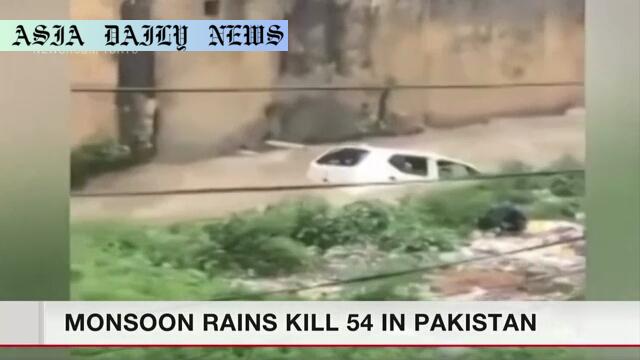Monsoon rains: Heavy floods in Pakistan’s Punjab have left 54 dead, over 200 injured, and caused widespread destruction.
- Heavy monsoon rains devastate Pakistan, killing 54 in 24 hours.
- Floods hit central Punjab, displacing villages and toppling buildings.
- 178 deaths recorded nationwide since late June monsoon onset.
- Authorities urge high alert as destruction escalates.

Heavy Rainfall Claims Lives Across Pakistan
In a tragic turn, heavy monsoon rains have ravaged Pakistan, claiming at least 54 lives within a span of 24 hours. These rains, which are concentrated in the central state of Punjab, have inundated villages and destroyed crucial infrastructure, leaving a trail of destruction in their wake. In total, more than 200 people have been injured, adding to a growing humanitarian crisis. Pakistan, a nation highly susceptible to climate-induced disasters, has been grappling with the turmoil wrought by monsoon seasons year after year. This year’s unrelenting deluge is proving to be no exception.
Monsoon Season Unveils Vulnerabilities
Pakistan’s monsoon season, which began in late June, has so far resulted in 178 fatalities nationwide. These figures paint a grim picture of the escalating climate crisis in South Asia. Record monsoon rains in 2022 highlighted the fragility of the national infrastructure, submerging nearly one-third of Pakistan’s landmass and resulting in a staggering 1,700 deaths. This devastation also badly impacted Pakistan’s economy, compounding the challenges in an already fragile economic environment. Early data from this monsoon season suggests its trajectory could mirror the destruction seen last year if proactive measures are not taken.
Urgency for Precautionary Measures
The Pakistan Meteorological Department and disaster management authorities are urging citizens to remain vigilant. Warnings have also been issued to prepare for potential worsening of conditions as rains continue. The pattern of destruction evident in recent years underscores the urgent need to bolster resilience against natural disasters. From inadequate infrastructure and housing to insufficient mitigation measures, there is a clear demand for immediate government intervention and international cooperation in disaster management efforts to build climate resilience.
Humanitarian and Economic Ramifications
Beyond the immediate death toll and injuries, countless individuals displaced by floods face significant short-term and long-term challenges. Families losing homes and livelihoods will look to already stretched government support systems for aid and restoration efforts. Meanwhile, the economic effects are likely to ripple across all industries – agricultural sectors in inundated rural regions may experience widespread crop failures and financial losses. Additionally, repair costs for damaged infrastructure will strain public funds, potentially fueling further economic instability.
Global Responsibility in Climate Challenges
The extreme weather Pakistan has endured over recent years is a stark reminder of the global consequences of climate change. The shift in monsoon patterns and the intensification of rainfall are clear ramifications of an increasingly warming planet. While Pakistan bears the brunt of these outcomes today, the global community must come together to address these challenges through partnerships, funding, and climate-action initiatives. Nations contributing higher levels of carbon emissions should step up and aid countries like Pakistan to adapt and recover from these continued catastrophes.



Commentary
The Human Toll of Climate Disasters
The human cost of the monsoon rains in Pakistan cannot be overstated. Fifty-four lives lost in a single day are far more than numbers – they are individuals, families, and legacies disrupted by forces completely out of their control. Every monsoon season, one cannot help but wonder if the lessons from prior calamities have been adequately implemented as cautionary tales. However, the continued devastation suggests much work remains to adopt proactive, life-saving measures.
Uncertainty as the New Norm
Pakistan’s experience is a stark reminder of the unpredictability brought about by a changing climate. What was once considered rare weather events now seems almost regular on the annual calendar. The distressing part isn’t just the frequency; it’s the lack of preparedness in addressing such crises. This recurring devastation exemplifies a broader question facing the world – are we truly ready to weather the storms climate change is rapidly bringing? For Pakistan, the answer, for now, seems to still lie out of reach.
A Call for Global Collaboration
While Pakistan must strengthen its internal systems, resources to do so often fall woefully short due to economic limitations. This is where international collaboration becomes critical. Wealthier nations, especially those contributing significantly to climate change, hold a moral responsibility to assist vulnerable countries. Whether through financial aid, climate adaptation projects, or disaster management expertise, the world must create a system of shared responsibility to ensure no nation faces these crises alone. A collective response is crucial to prevent the suffering from continuing unabated with every passing monsoon season.